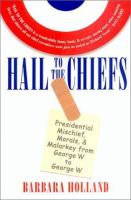Reviewed by Nancy
History can be fun. No, no, I'm not kidding. If
you did not enjoy history in school, here's your second chance. You can have
fun reading some history and there will not be a teacher lurking about, waiting
to give you a grade.
The book you need to read is Hail To The Chiefs by Barbara Holland. Ms. Holland, who died in 2010, was an author and
essayist who lived in Virginia's Blue Ridge Mountains.
If Ms. Holland had not been busy writing, she
could have come down from the mountain and been our stand-up history comic. I
am not kidding. Her book offers a summary of presidential mischief, quirks and
accomplishments from George Washington to Ronald Regan. The book also includes
entertaining tidbits regarding presidential wives.
Barbara Holland definitely had a way with words. A
great deal of this book, which devotes a few pages to each president, is laugh
out loud material. As she states in her discussion of Millard Fillmore,
"in the nineteenth century, whenever anything happened the bystanders got
together and formed a political party about it." Fillmore was a member of
the Anti-Masonic Party, and the author sums him up in this way: “He
wasn't a bad man - in fact, he quite nice. He was just wrong a good deal of the
time.” She further states, "In July of 1850 Millard Fillmore found himself
President and hit his stride at being wrong."
Or try this tasty tidbit. "James Monroe is
remembered for the Monroe Doctrine, which some consider John Quincy Adam's
finest achievement."
On Abraham Lincoln she states, "Lincoln never
had much fun being President because of the Civil War all the time. It was all
ready to roll when he took office, and five days after it was over he was dead
as a duck. He had the war, the whole war, and nothing but the war."
On James Buchanan, Lincoln’s predecessor, and the
run up to the Civil War she gives us the following: “He thought if he
just sat still and kept his mouth shut, things wouldn’t fall apart until he
could hand them over to the next man and run like hell.”
See? History can be fun. Seriously, it would
have been ok with me if this woman had taught half the history courses I ever
had.
The fun just never stops. Here’s what Ms. Holland
had to say regarding one world conflict: “I don’t recommend your trying to
understand World War I unless you plan to make a career of it, and I don’t
recommend that either.”
President James Garfield could write Latin with
one hand and Greek with the other hand AT THE SAME TIME. I once worked with
someone who could render backward cursive writing with her non-dominant hand,
but I believe this may top that.
In the section on Ronald Regan, Ms. Holland takes
five pages to render a summation of the plot of “Bedtime for Bonzo,” former
President Regan’s most famous movie. I believe I have watched parts of that
movie, but never the movie in its entirety at one sitting. Upon reading the
plot summary I realized why. Even when I was eleven I doubt I could have gotten
through it; however, I enjoyed Ms. Holland’s summary immensely.
I suppose it could be a sly “editorial comment of
omission” from Ms. Holland that the movie summary constitutes the entire
section on Regan. There is nothing about the Iran-Contra difficulties, John
Hinckley, Jr.’s assassination attempt on Regan’s life, supply-side
economics, the invasion of Grenada, or any of the rest of his time in
office.
If you think you don’t have the desire or the time
to read this book, at least get hold of a copy and have a look at the portrait
of Millard Fillmore. Mr. Fillmore resembles what current celebrity personality?
Correct! Alec Baldwin. It's something about the eyes. Maybe also the mouth.
I felt I was astute to notice this and wondered if
anyone else had, so I fooled around on the internet a little. Gee whiz. I'm not
the first. If you've got a moment for some silly entertainment, plug "Alec
Baldwin Millard Fillmore" into a search engine. The resemblance is uncanny.
As if the body of the text weren’t side splitting
enough, most of the footnotes are a riot. I know I’ve gone on enough about all
this, so I’m not going to start quoting footnotes, BUT there’s one you just
have to read. It’s in the chapter on William McKinley. In the library copy of
the book this is on page 174. Start midway through the fourth paragraph and
read the text preceding footnote 14. Don’t worry about the context. Just read
the last half of that sentence and then the footnote. HA!
I know if I can get this book into your hands you
will not be able to keep from reading it, so you’d just better get in to the
library and check out that footnote!

No comments:
Post a Comment